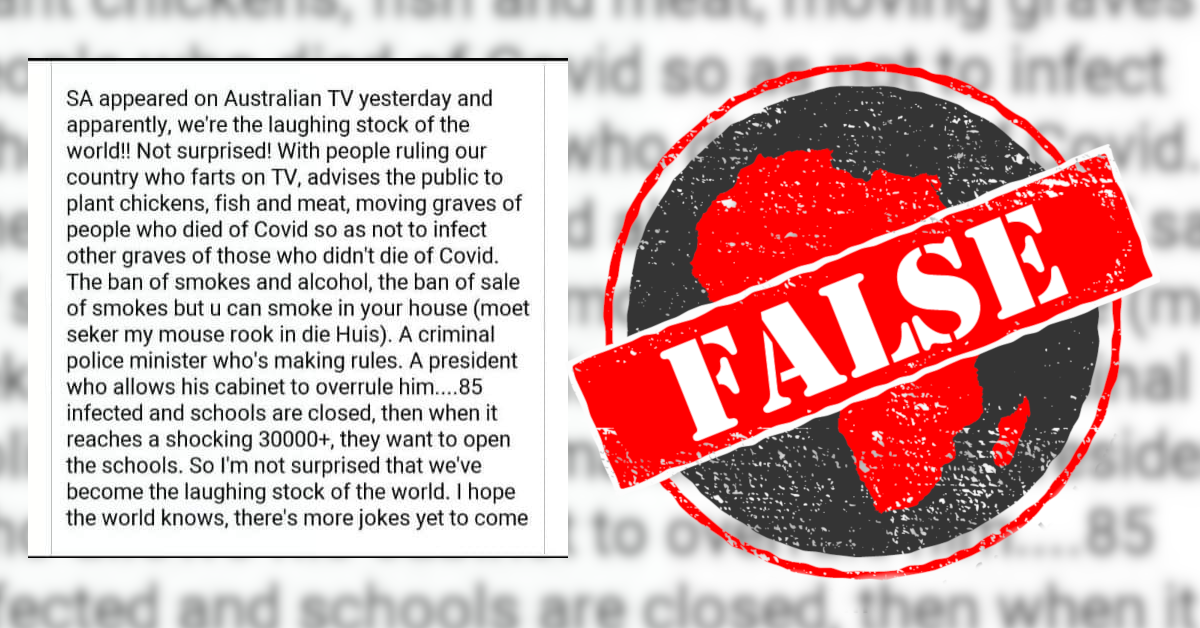South African politicians have advised the public to plant chickens, meat, and fish. That’s one of the more shocking claims in a screenshot shared on Facebook on 25 May 2020.
It reads: “SA appeared on Australian TV yesterday and apparently, we’re the laughing stock of the world!!! Not surprised!”
The screenshot lists some of South Africa’s lockdown regulations, including the ban on cigarette and alcohol sales. It also claims that “people ruling our country” advised “the public to plant chickens, fish, and meat”.
South Africa’s lockdown to slow the spread of Covid-19 eased into level 3 on 1 June. This has opened up more sectors of the economy and lifted the ban on the sale of alcohol, though the sale of tobacco remains illegal.
But have South African politicians advised the public to plant chickens, meat, and fish? We checked.

The claim can be traced to an article on the South African website Pineapple Beer, dated 16 May. Its headline reads: “People need to start planting chicken, fish and meat in their backyards to help fight hunger in South Africa.”
The article says the agriculture department has urged citizens to help the government fight hunger by planting food gardens in their backyards.
It quotes the department as saying: “There are many things you can grow at the back of your house. You can grow meat, chicken or even fish. These things don’t even take too long to grow and they don’t require a lot of water. If we are determined to grow South Africa together, let’s grow meat together.”
But a disclaimer at the bottom of the article reads: “The above article is satire.” Pineapple Beer is a satirical website and its content is clearly labelled as satire.
Satire can be defined as “the use of humour or exaggeration in order to show how foolish or wicked some people’s behaviour or ideas are”. Satire can’t be fact-checked, because it isn’t presented as fact.
But when satire is reused as fact, as real news, it becomes disinformation.
South Africa was featured on Australian TV channel 9News in a special about how South Africa, India and Brazil were coping with Covid-19. It aired on 21 May.
But the programme focused on humanitarian aspects of the pandemic, such as access to food, not on how individual governments were implementing lockdown regulations. – Naledi Mashishi
It reads: “SA appeared on Australian TV yesterday and apparently, we’re the laughing stock of the world!!! Not surprised!”
The screenshot lists some of South Africa’s lockdown regulations, including the ban on cigarette and alcohol sales. It also claims that “people ruling our country” advised “the public to plant chickens, fish, and meat”.
South Africa’s lockdown to slow the spread of Covid-19 eased into level 3 on 1 June. This has opened up more sectors of the economy and lifted the ban on the sale of alcohol, though the sale of tobacco remains illegal.
But have South African politicians advised the public to plant chickens, meat, and fish? We checked.

Claim from satirical website
The claim can be traced to an article on the South African website Pineapple Beer, dated 16 May. Its headline reads: “People need to start planting chicken, fish and meat in their backyards to help fight hunger in South Africa.”
The article says the agriculture department has urged citizens to help the government fight hunger by planting food gardens in their backyards.
It quotes the department as saying: “There are many things you can grow at the back of your house. You can grow meat, chicken or even fish. These things don’t even take too long to grow and they don’t require a lot of water. If we are determined to grow South Africa together, let’s grow meat together.”
But a disclaimer at the bottom of the article reads: “The above article is satire.” Pineapple Beer is a satirical website and its content is clearly labelled as satire.
Satire can be defined as “the use of humour or exaggeration in order to show how foolish or wicked some people’s behaviour or ideas are”. Satire can’t be fact-checked, because it isn’t presented as fact.
But when satire is reused as fact, as real news, it becomes disinformation.
Australian TV special on three countries
South Africa was featured on Australian TV channel 9News in a special about how South Africa, India and Brazil were coping with Covid-19. It aired on 21 May.
But the programme focused on humanitarian aspects of the pandemic, such as access to food, not on how individual governments were implementing lockdown regulations. – Naledi Mashishi
Republish our content for free
For publishers: what to do if your post is rated false
A fact-checker has rated your Facebook or Instagram post as “false”, “altered”, “partly false” or “missing context”. This could have serious consequences. What do you do?
Click on our guide for the steps you should follow.
Publishers guideAfrica Check teams up with Facebook
Africa Check is a partner in Meta's third-party fact-checking programme to help stop the spread of false information on social media.
The content we rate as “false” will be downgraded on Facebook and Instagram. This means fewer people will see it.
You can also help identify false information on Facebook. This guide explains how.



Add new comment